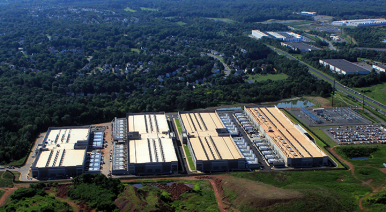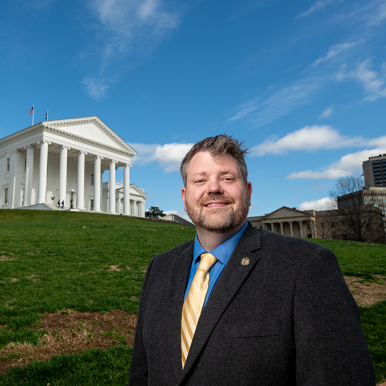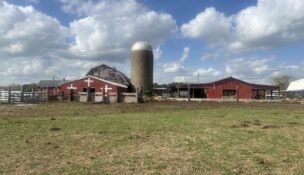Digital divide
Data center boom sparks opposition, regulation bids

State Del. Josh Thomas, D-Prince William, stands in The Townes at Village Place, a Gainesville community of town homes where neighbors have complained about an adjoining 70-foot-tall data center that was built 200 feet away from their homes last year. "We need some type of guardrails," says Thomas, who has advocated in the General Assembly for regulations on data center development. Photo by Shannon Ayres

State Del. Josh Thomas, D-Prince William, stands in The Townes at Village Place, a Gainesville community of town homes where neighbors have complained about an adjoining 70-foot-tall data center that was built 200 feet away from their homes last year. "We need some type of guardrails," says Thomas, who has advocated in the General Assembly for regulations on data center development. Photo by Shannon Ayres
Digital divide
Data center boom sparks opposition, regulation bids
In a relatively short time, Josh Thomas has seen the Prince William County district he represents in the Virginia House of Delegates transform from farmland and residential neighborhoods to massive buildings filled with the digital infrastructure that stores, processes and distributes huge amounts of information across the global internet, from cloud computing for businesses to streaming media for home entertainment.
“This use of land is changing the character of the district,” says Thomas, a Democrat who was elected to his first term in the General Assembly last November. “Farmland is becoming industrial. That’s something residents didn’t sign up for. We need some type of guardrails.”
Thomas’ district is slated to become home to the Prince William Digital Gateway, which, if completed as planned, would be the largest data center complex in the world. The Prince William County Board of Supervisors approved the project to build the campus of more than 30 data centers on 2,100 acres next to the Manassas National Battlefield in December 2023 following a contentious 27-hour public hearing. One of the selling points of the potentially $40 billion project was the anticipated $500 million in annual local taxes it could eventually generate for the county, which already has 8.3 million square feet of data centers.
Regionally, around 300 data centers are sprawled across Loudoun, Prince William and Fairfax counties, with the majority in Loudoun. The Ashburn area in Loudoun is home to the world’s largest concentration of data centers, a zone known as Data Center Alley.
Data centers have brought significant economic benefits to state and local coffers. According to the Data Center Coalition, the industry invested $37 billion in the commonwealth over just the past two years.
About 30% of Loudoun’s local budget comes from data centers, and officials estimate the industry will pay about $900 million in real estate and business personal property taxes for fiscal 2025, which begins July 1. “Our area is kind of used to [data centers] at this point and understands the benefits to schools and roads,” says Sen. Suhas Subramanyam, D-Loudoun.
And even more data centers are on the way.

Doubling down
“Virginia continues to distinguish itself as one of the most dynamic and important locations in the world for digital infrastructure that enables our innovation economy and meets the growing collective demands of individuals and organizations of all sizes,” says Data Center Coalition President Josh Levi.
Amazon Web Services, which invested $35 billion in Virginia data centers between 2011 and 2020, announced in 2023 that it plans to invest another $35 billion by 2040 to develop multiple data center campuses across Virginia.
The rampant growth of the data center industry has prompted a backlash from a range of environmental, conservation, historic preservation, climate advocacy and neighborhood groups up and down the Interstate 95 corridor.
This has resulted in some contentious local battles, often with political consequences. For example, in Prince William, Democrat Deshundra Jefferson, an opponent of unregulated data center growth, unseated the board’s incumbent at-large chair, Ann Wheeler, in a 2023 primary, largely over Wheeler’s support for the Digital Gateway project. County residents in January filed a lawsuit seeking to walk back the lame-duck board’s December 2023 approval of the Digital Gateway, just weeks before the new board took office on Jan. 1.
And in King George County, three outgoing supervisors voted in December 2023 to approve a $36 million tax rebate and tiered tax breaks for a $6 billion Amazon.com data center complex. But in January, a newly reconfigured five-member board — headed by a new chairman who had voted against the project — voted to renegotiate with Amazon, and also accepted the resignations of the county administrator and county attorney, although it was not clear that the resignations were connected to the Amazon deal.
Opponents argue data centers strain the state’s electric grid, consuming up to 50 times more power than typical commercial users, leading to increased costs for ratepayers. They also contend that data centers consume significant amounts of water, and negatively impact the character of nearby natural, historical and cultural resources and residential neighborhoods with noise pollution from massive HVAC units.
Advocates for data centers counter that the industry has endeavored to reduce centers’ environmental impacts and is willing to work with communities on the best placement for the facilities.
In response, Thomas and his General Assembly colleagues on both sides of the political aisle sponsored a multitude of bills in this year’s session seeking to place limits on data center development. Proposed legislation included requiring compliance with energy efficiency standards for tax credits, buffers between data centers and parks and residences, site assessment impacts on historical, agricultural and cultural resources, as well as water usage and carbon emissions and shifting the costs of additional electric demand to data centers.
None of the bills were approved, with most handed off to be included in a study of data centers’ impacts in Virginia by the Joint Legislative Audit and Review Commission, the state’s watchdog agency. JLARC plans to release that report late this year. Legislators welcome JLARC’s intensive look into data centers but are determined to keep up pressure on the industry and plan to submit more bills tackling data center development in the 2025 session.
Striking a balance
“People in Prince William have not been heard by the industry,” says Thomas, who sponsored three bills during the 2024 session dealing with the placement of data centers. “If we can get at least one reform-related bill out, the tide will start to turn.” One of his bills, HB338, encouraging localities to perform site assessments at their discretion before approving data centers, was the only data center-specific measure to make it through crossover when bills introduced in one chamber cross over to be voted on in the other. A Senate subcommittee continued the bill to the 2025 session.
“I knew it would be a tough fight, but I was surprised by the immense power that the data center industry wields in Richmond,” he says. “The industry has vehemently fought any data center-specific bill. Their tactic is the JLARC study — [to] wait and fold all the bills into that.”
Thomas believes HB338 made it as far as it did because it proposed a standard set of data points, including impacts on carbon emissions and water quality, for localities to consider when approving data centers. An amendment weakened the bill from mandating to encouraging site studies. Still, he is heartened by bipartisan support for increased statewide regulation of data centers. The issue impacts both Democrats and Republicans, he says. “Northern Virginia has grown and pushed out farther and farther, so there are Republican areas that could be next.”
A House subcommittee also tabled a data center reform bill from another Prince William delegate, Republican Ian Lovejoy, that would have prohibited data centers within one-quarter mile of schools, parks or residential areas. Lovejoy, who was elected last November to represent western Prince William County, says data centers are being built adjacent to residential neighborhoods in his district. “These areas have been rezoned from residential to light industrial to allow data centers to go there. It violates Urban Planning 101 in that you don’t put industrial uses adjacent to residential areas.”
Both Thomas and Lovejoy stress that they’re not opposed to data center development in Virginia but believe safeguards are essential.
“The goal is not to kill the data center industry,” Lovejoy says. “Data centers in appropriate locations get overwhelming support, but we need to have reasonable bumpers in place so a balance is struck between the industry’s needs and its neighbors’ needs.”
Levi says the industry supports the JLARC study: “We remain committed to continuing to work collaboratively with legislators and other stakeholders to ensure positive economic, environmental and social outcomes while building and supporting Virginia’s 21st century economy.”

Demanding answers
Thomas, who plans to submit more data center bills in 2025, including revisiting those tabled this year, is especially concerned about the environmental impacts of data centers. “If you turn on 35 to 37 data centers over the next 10 years, each one uses an immense amount of power,” he says. “Dominion Energy cannot give us a straight answer on whether they can provide that power with clean or renewable energy.”
About 95% of all new power plants Dominion Energy is building over the next two decades will be carbon-free — including “offshore wind, solar, battery storage and advanced nuclear” — while about 5% will be natural gas, states Aaron Ruby, manager of media relations for the utility. (See related energy story.)
Dan Holmes, legislative director for Clean Virginia, a clean energy advocacy group, believes unchecked growth of data centers could impact the state’s mandate to attain 100% renewable energy generation by 2050. He points out that Dominion Energy anticipates energy demands
doubling over the next 20 years as more data centers are built.
“That will have severe consequences,” he says. “It impacts future retirements of power plants and interconnection problems with renewables. Those are huge challenges.”
Increasing numbers of residents are demanding answers as local governments rubber-stamp data centers, Holmes says. “It’s hard for local governments to say no to massive data centers because of the [tax] revenue they bring. They’re offered huge revenue opportunities but are not prepared to address the large questions and are not experts on energy or the infrastructure these centers require. Some localities are just now understanding the challenges after they’ve approved these things.”
Gregory A. Riegle, a partner with McGuireWoods law firm, has represented data center developers and operators for 25 years and says the industry has evolved to embrace green technology and aesthetically pleasing designs.
“Localities are increasingly identifying places where the industry would be a good fit and defining locations where it would be welcome and [could] balance the benefits of the industry with the impacts to the locality,” he says. “The industry is willing to have a dialogue with communities to get the right use in the right place.”
Riegle believes the JLARC study will bring stakeholders together to address concerns. “It’s good that they are taking time to look at [the issue] cohesively,” he says. “More time may lead to a more informed process.”
However, he warns against the General Assembly taking a one-size-fits-all approach by implementing a uniform set of regulations. “Ultimately, localities have to decide what’s best for their community. What makes sense for Loudoun County is different from what makes sense in Henrico County. You have to trust local governments to balance the issues because ultimately local elected officials are responsible to their own community.”
In Loudoun, state Sen. Subramanyam worries about long-term impacts from data centers, including the possibility that the infrastructure may one day become obsolete. And if that happened, he asks, “where does that leave our communities if they become so reliant on data centers for revenue? Right now, with the advent of AI and the need for data storage, data centers are needed more than ever, but we’ll see what happens in 10 to 20 years.”
Power struggles
Subramanyam believes JLARC’s findings will provide support for this session’s tabled bills proposing data center regulations, including bills he sponsored requiring data centers to commit to energy efficiency standards and to use renewable power sources to qualify for sales tax exemptions, as well as making the industry financially responsible for additional power lines needed for their facilities instead of putting the burden on all ratepayers.
“Data centers, while bringing a lot of revenue to the counties they are in, take up a lot of power,” he notes, adding that he’s concerned consumers could see their utility bills double in the next decade as more data centers come online. “We want to make sure data centers are offsetting the cost of building additional power infrastructures.”
However, Dominion forecasts that its residential customers’ monthly bills will increase by less than 3% annually over the next 15 years. “For a typical residential customer, that would mean an increase from about $133 a month to about $174 a month over a 15-year period,” says Ruby. “That’s lower than the normal rate of inflation.” He adds that Dominion’s residential rates are 18% below the national average and 34% below the mid-Atlantic average.
While there is often a partisan divide over renewable energy, Subramanyam contends that Democrats and Republicans want to retain green spaces and undeveloped areas. “That desire is on both sides when it comes to conservation and ensuring that in any sort of business development, the people who live in that community are getting a good deal.”
Meanwhile, grassroots groups say they’ll continue to sound alarms about data center developments. The Virginia Data Center Reform Coalition, composed of more than 40 environmental, conservation, historic preservation and climate advocacy groups and community and homeowner associations, has vigorously campaigned for statewide data center regulations. “This was a good start,” says Julie Bolthouse, director of land use for the Piedmont Environmental Council, a leader in the coalition. “Unfortunately, it’s going to take longer than we hoped, but many people are becoming aware of these impacts.”
Bolthouse was especially encouraged that legislators from both sides of the aisle came together to support data center reforms. “We’re seeing a lot more legislators that have heard about the issues and have a vague understanding that data centers use a lot of energy and water, but definitely a whole lot more education is needed.”
The JLARC study will provide concrete details about those usage rates, she adds. “There’s never been a hard look at impacts to the environmental and infrastructure grid. The impacts are already piling up, and changes are needed right now to address them. “We’re going to keep sharing what’s going on and keep raising awareness that costs are piling up if the state doesn’t take action.”
Action will come, adds Lovejoy. “The data center issue doesn’t know Republican from Democrat. It affects our constituents, so we have no choice but to find common ground.”
Editor’s note: This story has been corrected and updated from the April 2024 print issue version, which contained incorrect information related to the King George County supervisors’ election and a proposed Amazon.com data center complex.



















